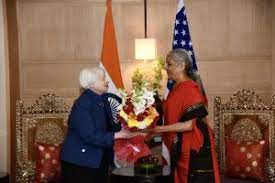Mutual benefit: On India-U.S. cooperation on trade
Both India and the U.S. stand to gain by enhancing cooperation on trade
Treasury Secretary Janet Yellen’s visit to India last week highlights the renewed focus in the U.S. on strengthening economic ties with Asia’s third-largest economy and ‘one of America’s indispensable partners’. The current global environment with its macroeconomic, trade and strategic challenges makes it all the more compelling for the world’s two largest democracies to deepen their engagement in a way that is mutually beneficial. In Delhi, Ms. Yellen emphasised that “the United States and India share an interest in strengthening our supply chains in a world where certain governments wield trade as a geopolitical weapon”. The U.S. was particularly keen to minimise its vulnerability to supply-chain disruptions and was therefore pursuing a strategy of ‘ friendshoring ’, with India, a key element in the plan to cut its reliance on ‘countries that present geopolitical and security risks’ to the supply chain. Citing the Ukraine invasion and asserting that Moscow had ‘ weaponised ’ its supply of natural gas to Europe, as well as the challenges of China’s dominance in the production of products such as solar panels, she underlined Washington’s keenness to nurture local partners in developing countries to help mitigate over-concentration on select suppliers.
Ms. Yellen’s visit also highlights the opportunities and challenges in the bilateral economic relationship, especially as the current dispensation in Washington moves to mend the ruptures caused by the Trump administration’s antagonistic decisions on trade including the withdrawal of duty-free access to Indian exporters under the Generalized System of Preferences (GSP) as well as a 2020 decision to put India back on the U.S. Treasury’s ‘Monitoring List’ over its currency practices. The U.S. is still to reinstate the GSP benefit and exporters on both sides still face challenges, notwithstanding the fact that the U.S. is one of India’s largest trading partners. In fact, the International Trade Administration of the U.S. notes in its investment climate summary on India that “new protectionist measures, including strict enforcement and potential expansion of data localisation measures, increased tariffs... and Indian-specific standards not aligned with international standards effectively closed off producers from global supply chains and restricted the expansion in bilateral trade and investment”. With India set to take up the reins of the G-20 presidency, New Delhi has a chance to steer the global economic and trade agenda towards greater equity, including on climate change, especially given Ms. Yellen’s vocal assurance of U.S. backing. Both sides stand much to gain by enhancing mutual trust and cooperation, particularly on trade.
